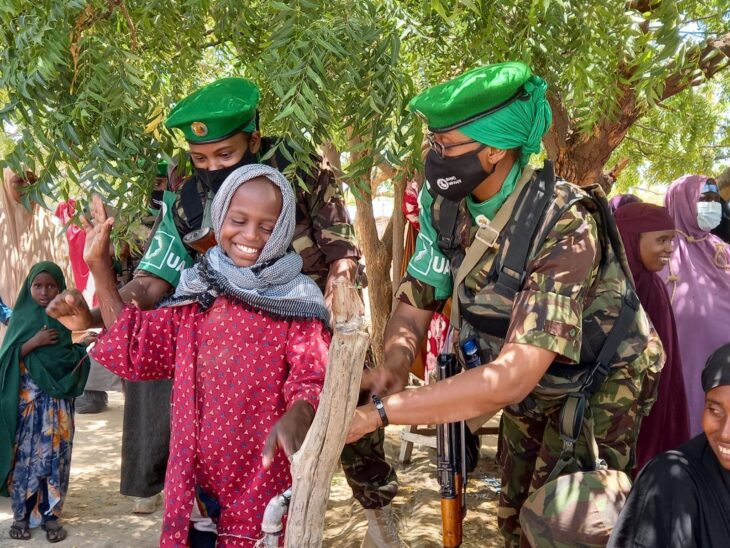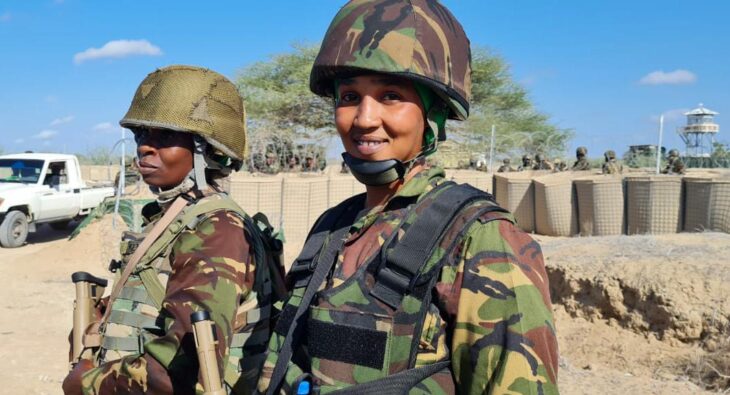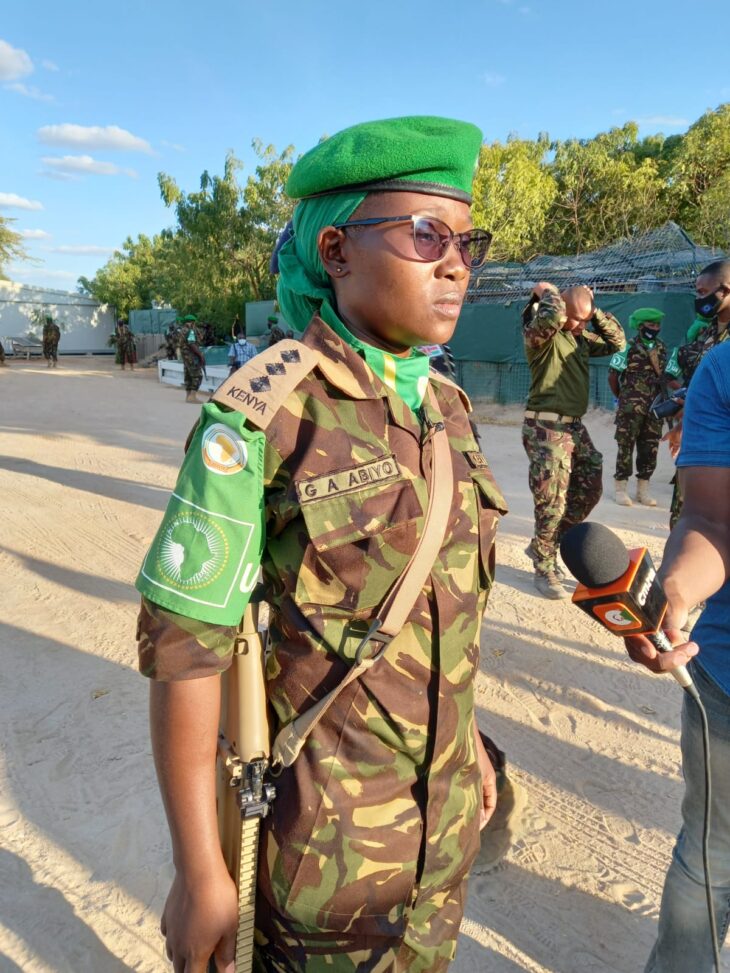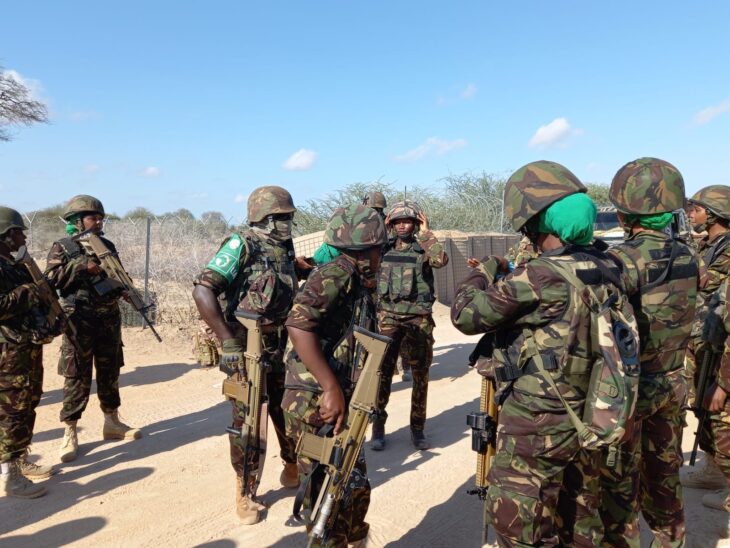DHOBLEY, Somalia, Oct 12 – The Kenya Defence Forces (KDF) first entered the Horn of Africa nation in 2011 in a government-backed military operation, code name Linda Nchi (Protect the Nation).
The Kenyan troops were deployed to Somalia through the southern border with clear instructions of establishing a security buffer zone to tame the Al-Shabaab group, which had extended its tentacles of terror throughout the region – with its insurgents launching attacks in Kenya.
On February 22, 2012, KDF rehated into the African Union Mission in Somalia (AMISOM), following the United Nations Security Council Resolution 2036.
As part of the troop-contributing countries, Kenya became part of the AMISOM mandate which includes, reducing the threat posed by the Al Shabaab, assist the Somali security forces to provide security for the political process at all levels as well as stabilization, reconciliation, and peacebuilding in the country.
As the command and structure of the military change over the years, more women have become part and parcel of its efforts in serving the people of Somalia and reaching out to the most vulnerable, mostly women and children in the community.
Dhobley Forward Operating Base (FOB) which is also the headquarters and command centre of AMISOM’s Sector 2, has become a symbol of change for progressive military best practice across the region.
–Entering Dhobley–
The dusty road to the Dhobley District Hospital is one of the many the area has become accustomed to, with its bumpy terrain synonymous with the challenges thousands in the region have been forced to surmount amidst the fog of uncertainty as a result of insurgent groups that have meted terror on them.
Lining the road to the hospital are women walking towards the health facility, seeking the all too critical services as they clutch to their young ones, eager to be attended to by the resident military doctors.
As locals receive medical treatment, it is also hard to miss a contingent of female military officers donning jungle green uniforms, strategically positioned around the facility, while providing real-time security in the event terror presents its ugly, brutal face.
Armed with the sophistication of heavy weaponry, their main mandate is to pacify the enemy without a second thought but the green scarves over their heads set them apart from other soldiers.
This has enabled local women to confide in them as many have put their guard down, allowing themselves to receive the help that this special unit, identified as the Female Engagement Team (FET ) has to offer.
“The significance of these engagements is that in a war set up and our engagements are geared towards assisting the women in our area of responsibility. Because in any conflict, women and children are the ones that bear the greatest brunt,” Said Captain Gertrude Abiyo, Team leader, FET.
“The women are ones present at the home, they are the ones who raise the children, who own the small businesses in Dhobley town, and the same women are the key stakeholder in peace and conflict resolution process.”
In any armed conflict situation, the soldiers say that reaching out to the most vulnerable members of the community remains the most difficult task.
The ladies had to engage in smaller battles before being able to gain the trust of the women they are designated to serve and protect.
“I wish for you to understand that in this society, where we are, we have socio and cultural barriers. Therefore, we as the female soldiers under AMISOM 10, we are here so that we can be able to reach out to these women with ease because the male cannot be able to reach out to them. Our main role is just to be the lead in caring for the women,” she said.
Before engaging the women in activities that would benefit them economically, FET has had engagements with them on various occasions about some of the chronic illnesses imposed on them within the society.
“The women have been sensitized on women matters, for instance, last month, we joined hands with the women and we held a seminar in the town that targeted not only women but men as well. They were sensitized on the sexual and gender-based violence, their effects, causes, and remedies to it,” said Captain Abiyo.
As part of their mandate under the AMISOM command, FET has enabled the women of Dhobley to better themselves while making that journey lighter under the harsh, seen, and unseen conditions, that the terrain in Dhobley brings to them every day.
“We have been facing so many challenges such as abuse against women, FGM, and even sexual harassment. Many women here for a very long time did not know where they could report some of these GBV cases which had serious repercussions on their lives,” Maimuna Abdulhamud, a resident Dhobley told Shahidi News.
Being a pastoralist community, many produce milk and have to walk several kilometers to and back from Dhobley town every few days to sell their product.
When the Shahidi News team visited Dhobley, they witnessed the women receiving milk cooler ATMs that they say will go a long way in enabling them to support their families and provide for their children with ease.
“AMISOM has really helped us. For instance, these milk ATM machines will surely change our lives. We have also been taught how to rear chicken for commercial purposes and also we have received medicine. We know the importance of peace and the importance of interacting with the women (officers) in AMISOM,” Anisa Maalim, another resident of Dhobley said.
Through the broken defences, that the FET has been able to achieve under the AMISOM 10 command, they have enabled 6 women to train as midwives at the AMISOM Level 2 Hospital in Dhobley with one interning at the Dhobley District Hospital. Five are working with women across villages in the area.
For these servicewomen, many battles are won through the power of persuasion and changing mindsets rather than on the battlefields.
Shortly after completing their community engagement for the day, aware of the battle that lay ahead, these highly trained female soldiers then proceed to join their male counterparts in the thickets that characterise this region, aware of the dangers that lurk in the shadows ready to strike at any time.
Gradually, the female soldier population has steadily risen in sector two, with the majority being stationed at the Dhobley Forward Operating Base.
Lieutenant colonel Reverend Jane Wairimu who is serving her second tour of duty in Dhobley has hailed the progress being made to include more women in the front line, saying though their presence was initially minimal to almost non-existent, the FET is slowly changing the narrative as they continue to play a critical role in peace efforts.
Those that serve alongside her, understand the call of duty and say that protecting the sovereignty of Kenya while enforcing the peace in Somalia is a responsibility that they do not take lightly.
“Our first encounter with the women was during the women’s day celebration, where they were invited into this FOB, and sensitised on the COVID-19. Thereafter we donated some foodstuffs and environmental cleaning equipment and also sanitary towels,” Captain Abiyo said during an interview with Shahidi News.
During their tour off duty, these Kenyan heroines will walk side by side with the women of Dhobley helping them build their lives, a day at a time.
Want to send us a story? Contact Shahidi News Tel: +254115512797 (Mobile & WhatsApp)





